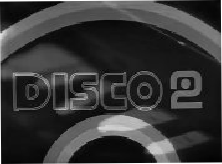
TV Pop Diaries
Pop Music on British Television 1955 -
It was a new decade, colour TV was now 'a thing', The Beatles were on their way out, so what would the 1970s possibly hold for us? Whatever it was, it had better be good.
Disco 2 was the successor to Colour Me Pop and featured acts performing live in a studio setting, the studio in this case being the vacated premises of Gerry Anderson’s Century 21 productions in Slough, Berkshire, and like its predecessor it had production ties to BBC2's daily arts strand Late Night Line Up, with Line Up's editor Rowan Ayes as producer.
Tommy Vance was the show’s first host, later to be replaced by Pete Drummond and Mike Harding from the second series onwards, while Richard Williams, who would later host the first series of the Old Grey Whistle Test was an interviewer on later editions, as was actor and Radio One DJ Mike Raven.
Vance explained the show's vision on the very first edition "our idea is to present
twenty-
Philip Jenkinson of Filmfinders was hired to provide animated sequences to fit the weekly oldies spot and album tracks, a job that would continue with The Old Grey Whistle Test.
Cramming in as much music in the time allowed meant that the host appeared to take
on the role of a DJ, occasionally crashing the intro of a song, something more akin
to Top of the Pops, and like Top of the Pops Disco 2 used a Led Zeppelin track for
their opening credits sequence, in this case Moby Dick. Disco 2 was recorded in a
small studio, so like Whistle Test the singer/songwriter types got to perform totally
live, but bands had to sing over a pre-
Jimmy Webb was due to appear on the show in June, but sadly didn't, whereas Noel Greenaway from the band Walrus had discussions with the show's producers about having a show dedicated to bands with a brass section.
When the show returned to begin its second series on 12th September 1970 there would be two hosts, Pete Drummond and Mike Harding, working on alternate weeks.
The show was voted the best TV pop show in the music weekly Melody Maker for 1970 and things were proceeding nicely, but controversy hounded the final shows as one of the production team had been on the unfortunate end of a News of the World sting when they accepted a £200 payment in return for the band Demon Fuzz making an appearance on the show. The band themselves knew nothing of the payment by the newspaper, so never gave permission to be involved. It was also suggested that payment had been made for The Equals’ Black Skinned Blue Eyed Boy to be played on the show. The person responsible later confessed to the BBC and was fired.
The final show was listed in the Radio Times as 'the last in the present series' which suggests that another series might have been a reality, but the show was dropped and gave way to a hastily arranged replacement, The Old Grey Whistle Test which launched two months' later, produced by Disco 2's Michael Appleton.
The Radio Times and newspapers would refer to the show as Line-
Disco 2 was a good start to the new decade, but was far too short at only twenty-
Only three complete shows and some live inserts are known to exist.
DISCO 2 / LINE UP'S DISCO 2
BBC2
10th January 1970 -
